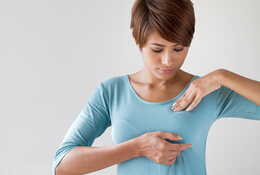Masa del seno

Breast Density

Breasts not only vary in size and shape — they can also differ in the proportion of various types of breast tissue. Compared with non-dense breasts, dense breasts contain more milk-producing glands and fibrous connective tissue and less fatty tissue. According to the American College of Radiology, as many as 50 percent of American women have dense breasts.
Why Does Breast Density Matter?
Dense breast tissue can make it harder for a screening mammogram to capture a clear image of the breast, which makes it more difficult to detect tiny abnormalities. Breast cancer is not only harder to spot in dense breast tissue, but is also more common among women with dense breasts.
Density is not Destiny
Fortunately, if you have dense breasts there are many things you can do to minimize your risk of developing breast cancer and improve your chances of discovering the disease early, when it is most treatable. Your doctor can help you assess your risk and decide on the best prevention and early detection strategy for you.
For example, you may be asked to have ultrasound (also called sonogram) or magnetic resonance imaging (MRI) screening tests in addition to your annual mammogram. Depending on any other risk factors you have, your doctor may also recommend healthy lifestyle changes; additional tests, such as genetic screening; or preventive medications.
Many women first find out they have dense breasts after receiving a routine mammogram. If you have recently been notified that you have dense breasts, you may wonder why you have never been informed before.
The fact is, you may have had dense breasts all along. The reason you have been told now is because in the past few years, researchers have recognized a strong link between dense breasts and increased cancer risk, prompting state governments to pass laws requiring that affected women be notified.
What you may not be told is the significance of dense breasts and what to do next. While suddenly learning you have dense breasts can be unnerving, there is no need to panic. Be proactive, learn all you can about the relationship between dense breasts and cancer, then speak with your doctor and take steps to minimize your cancer risk.
Your doctor can help you assess your risk and decide on next steps